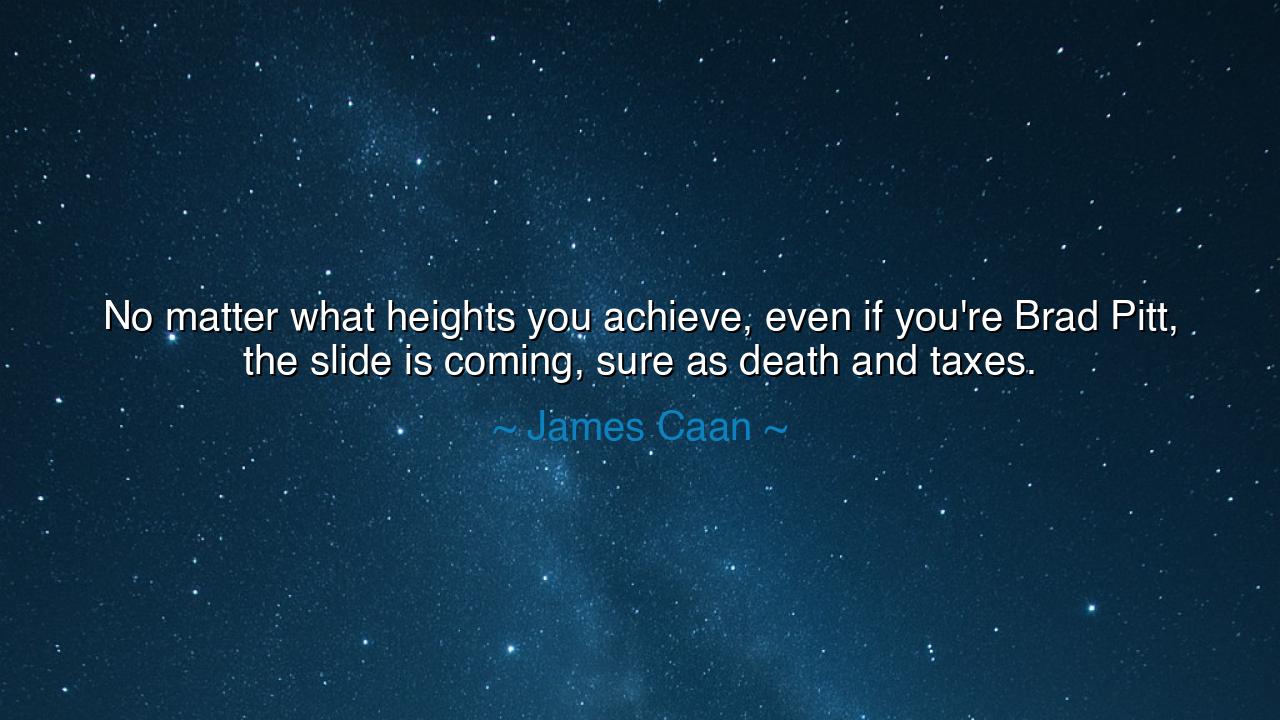
No matter what heights you achieve, even if you're Brad Pitt, the
No matter what heights you achieve, even if you're Brad Pitt, the slide is coming, sure as death and taxes.






The legendary actor James Caan, known for his fiery spirit and depth of humanity, once said: “No matter what heights you achieve, even if you’re Brad Pitt, the slide is coming, sure as death and taxes.” In this truth, spoken with the clarity of experience, lies a timeless lesson about fame, impermanence, and humility. It is the voice of one who has stood at the summit of success and seen, beyond the bright lights, the shadow that inevitably follows. Caan’s words are not filled with bitterness, but with wisdom born of time — the understanding that all things, no matter how glorious, must eventually fade.
From the dawn of civilization, the wise have spoken of this same law — that rise and fall are twin forces that shape the destiny of all things. Empires ascend and crumble, stars are born and burn out, and even the proudest kings are carried one day to the same earth as their servants. What Caan expresses in the language of Hollywood, the ancients knew as the cycle of fortune — the turning wheel that lifts one today and lowers him tomorrow. To reach great heights is noble; to remember their impermanence is divine. For it is not the ascent that defines a man, but the grace with which he endures the descent.
When Caan speaks of “Brad Pitt,” he invokes not envy but an example — a symbol of stardom at its brightest. Yet even the brightest stars must dim. To say “the slide is coming” is not a curse, but a call to humility. It is the reminder that fame, wealth, and youth are fragile currencies, bound by time’s unyielding laws. Just as death and taxes are unavoidable, so too is decline — the ebb that follows the flow. The wise do not mourn this truth; they prepare for it. For to know that the slide will come is to live with awareness — to treasure the moment, to act with gratitude, and to build one’s worth upon what endures beyond applause.
Consider the story of Alexander the Great, conqueror of the known world before the age of thirty. At the height of his triumph, he wept — not for joy, but because there were no more worlds to conquer. Yet soon after, sickness struck him down, and he died young, leaving behind a shattered empire. His victories, though immortalized, could not save him from mortality. Like James Caan, he learned — too late — that the summit is never permanent. Glory is a guest, not a companion. The lesson endures: the higher one rises, the more one must prepare the heart for the coming descent.
The origin of Caan’s reflection lies in a lifetime spent under the fierce and fleeting light of fame. He knew the heights — playing Sonny Corleone in The Godfather, earning the love of millions, walking the red carpets of Hollywood. But he also knew the silence that follows when the spotlight turns away. His words carry the weary truth of one who learned that the adoration of the world is as changeable as the wind. He saw careers built and broken, faces celebrated and forgotten. Out of this fire, his wisdom emerged: that to live for fame alone is to build a home upon sand.
Yet there is no despair in his statement, only realism — and within that realism, a spark of freedom. For if one accepts that decline is inevitable, then one is freed from the tyranny of comparison, from the desperate grasp for more. Caan’s insight is a call to authentic living: to work for love of the craft, to create for joy rather than applause, to live fully while the sun still shines. The artist who knows his glory will fade does not fear the twilight; he paints more fiercely before it comes.
The ancients might have called this the wisdom of impermanence, the art of letting go without regret. As the philosopher Marcus Aurelius wrote, “Everything we see is change; everything we do is but a passing act.” To live with this understanding is not to diminish life’s beauty, but to deepen it. For the flower’s loveliness is not less because it fades — it is precious because it does. Likewise, Caan teaches that the true measure of life is not how long one shines, but how deeply one burns.
So let this be the lesson: embrace the rise, and accept the fall. When fortune smiles upon you, be humble; when it turns away, be grateful still. Build your worth not on applause, but on integrity; not on fame, but on purpose. Work with passion, love those around you, and hold loosely to all that is temporary. For when the slide comes — as it surely will — you will not fall into despair, but into peace, knowing that you have lived well. Thus, as James Caan reminds us, even as the tides of fortune recede, the soul that has learned gratitude remains — unshaken, unafraid, and forever rich in spirit.






AAdministratorAdministrator
Welcome, honored guests. Please leave a comment, we will respond soon